hr-television, 12.15 p.m.
Late autumn in Rust. The wine is in the barrels. Thomas and Paul taste their first wine: something particularly fine is developing. Peace might have returned if Mother Stickler had not started to renovate the inn. The building work and especially Hermione's hectic energy keep everyone on their toes.
Bavarian Television, 1.30 p.m.
Schmidt Max got into his old Opel Kadett for "freizeit" and set off for the western, northern and eastern fringes of Franconia. He met ambitious winegrowers, special wines and hardly any tourists. He was accompanied by Hermann Mengler from the district of Lower Franconia, who advises the winegrowers on everything from cultivation to the finished wine. The wine drinker knows the Main triangle with its fine Silvaners and Bavaria's wine capital Würzburg. And he also knows that fine drops grow on the Keuper soils in the Steigerwald around Iphofen. Not to mention the Main quadrangle around Bürgstadt with its world-class Pinot Noirs. In addition to this Franconian wine trinity, there are small unknown regions in Franconia whose wines shine almost to the exclusion of the public. Ever heard of the Kahlgrund, the Obermain or the Saalestück? Schmidt Max got into his old Opel Kadett for "freizeit" and set off for the western, northern and eastern fringes of Franconia. He met ambitious winegrowers, special wines and hardly any tourists. Accompanying him was Hermann Mengler from the district of Lower Franconia, who advises the winegrowers from cultivation to the finished wine.
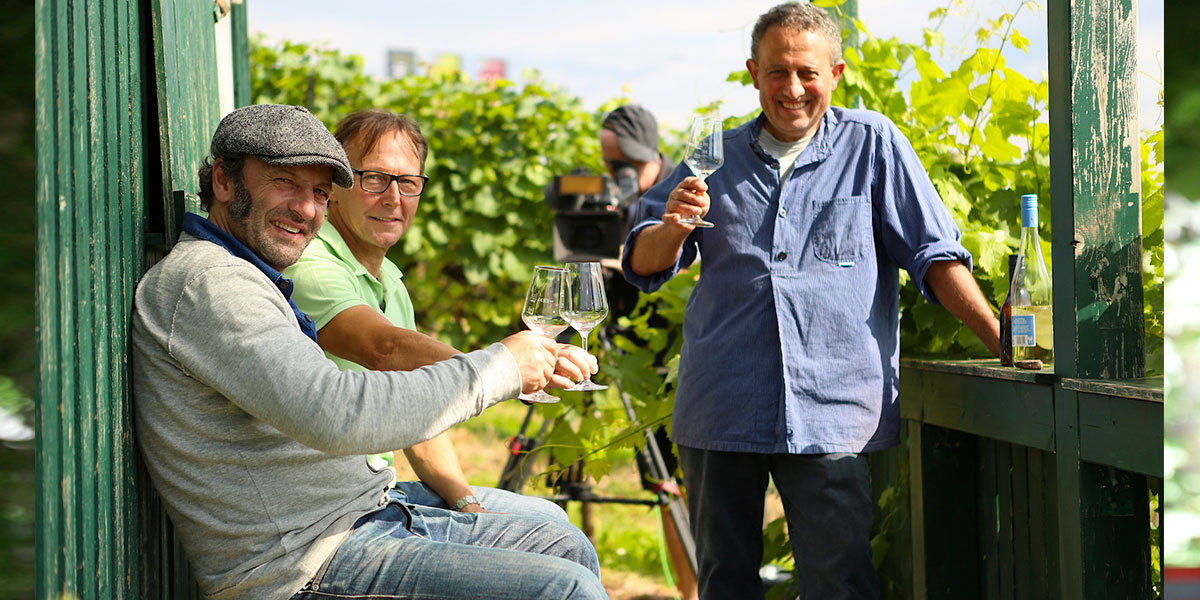 |
3sat, 3 .00 p.m.
The banks of the Tagliamento are ideal breeding grounds for wine. Especially in the last decades, there have been efforts in Friuli to revive the diversity of autochthonous grape varieties and to give many wine varieties that had fallen into oblivion a new future, for example by the winegrower Emilio Bulfon.
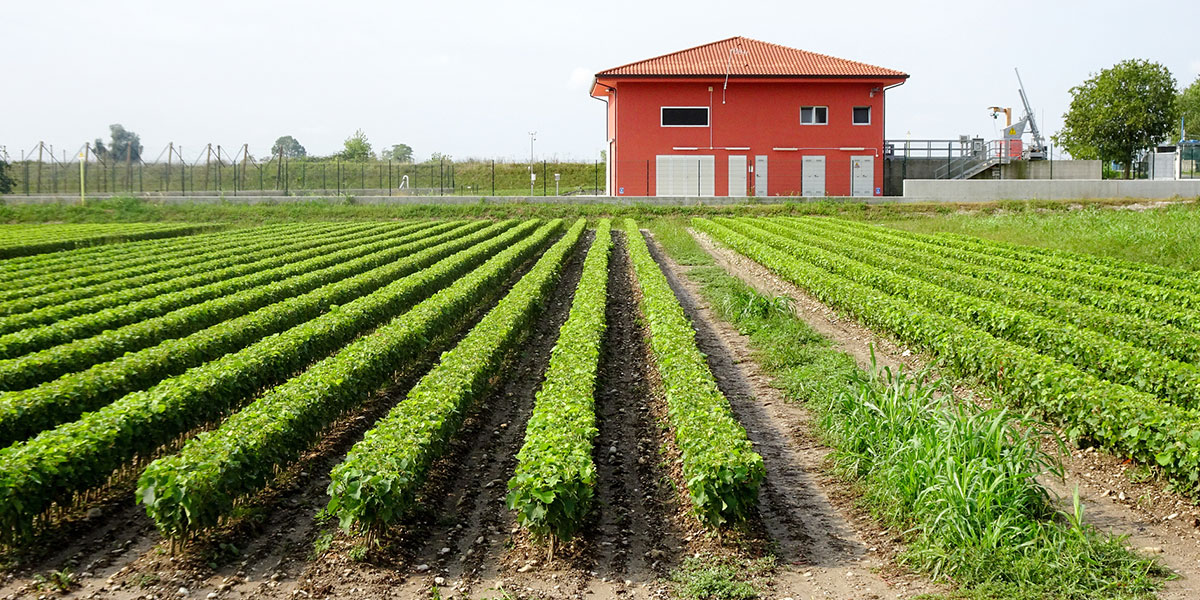 |
SWR Television, 5.00 p.m.
The Champagne region is known worldwide for its sparkling wine. Strict conditions in cultivation and processing make Champagne so unique. The grapes for this noble drink are harvested exclusively by hand. Year after year, harvest workers come from all over the world to be part of this process. Jessica Rihm from Munich also wants to experience what it's like to stand in the vineyard. She knows the theory very well, as she works in a wine school. But the strenuous harvest is also a new challenge for her. Jessica has chosen a small champagne estate in Cumières, in the Marne département. Things are supposed to be very family-like there. She is curious to see where the other harvest workers come from and is looking forward to working together and to the parties in the evening. But does her romantic idea of the harvest live up to reality? Aren't the physical strains much greater than expected? The viewers accompany Jessica on her work assignment in the Champagne region and are curious to see whether her dream trip will really remain one.
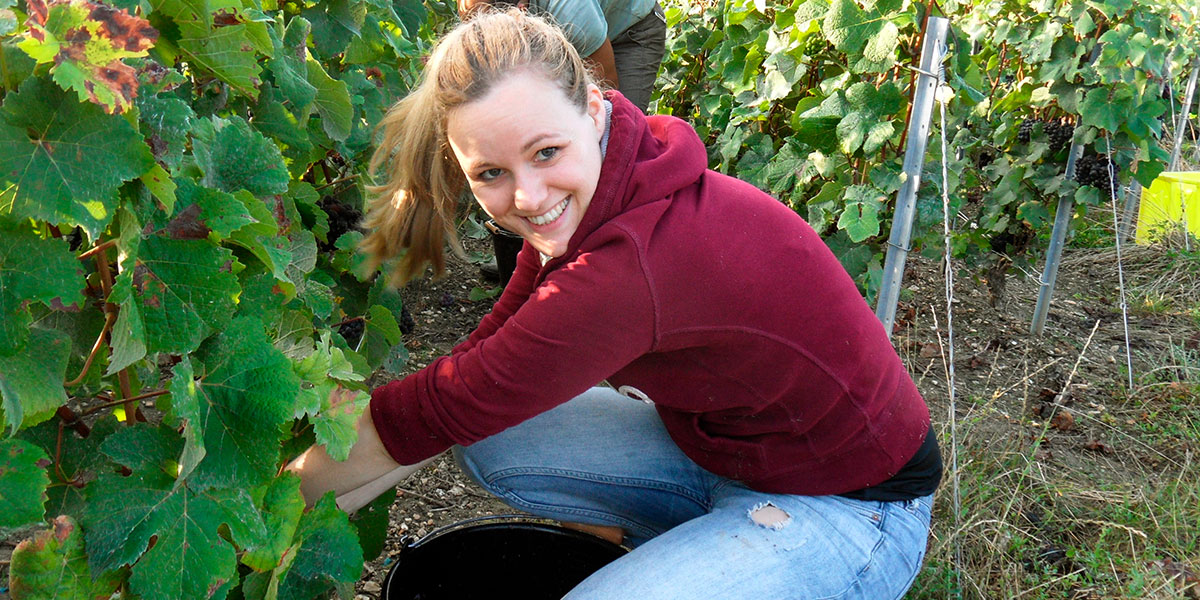 |
ORF III, 5.50 p.m.
With its sixty years of existence, the South Styrian Wine Road is the oldest of the eight Styrian wine roads. Along the narrow roads from Spielfeld and Ehrenhausen, via Gamlitz up to Ratsch and on to Leutschach, a pulsating world of experience has developed over the decades that no one who appreciates culinary delights, conviviality and a unique landscape can escape. The 25-kilometre-long road, lined with poplars and chestnut trees, runs for five kilometres directly along the border with Slovenia. Where once fear and mistrust reigned, today there is boundless joie de vivre.
hr-television, 3.45 p.m.
Juliane Hipp travels to Tarragona's hinterland, to the wine region El Priorat and to Sitges, a bustling holiday resort with many small shops, boutiques, galleries and studios. Not far away is the wine-growing region of Penedès, known for its famous Catalan sparkling wine Cavas.
Bavarian Television, 4.45 p.m.
The "Hungarian Sea", Lake Balaton, is the largest lake in Central Europe. It is known for its pleasant temperatures, its favourable climate and its unique, varied landscape. Visitors can expect mountains and hills, wine cellars over a hundred years old and atmospheric inns.
3sat, 5.00 p.m.
The forest, the Rhine and the wine - these three things not only characterise the central landscapes of the Palatinate, but also reveal a lot about the soul of the "German Tuscany". Where the mountains of the Palatinate Forest slowly disappear, the first vineyards appear on the edge of the Haardt. Along the German Wine Route, one winegrowing village follows the next, bordered by the wine metropolises of Landau, Neustadt and Bad Dürkheim.
3sat, 5.45 p.m.
The film shows the towns and landscapes along the Moselle and the Rhine in a new light: seen from above, the landscape reveals much of its history. Today, the Moselle still benefits from its most important Roman heritage, viticulture.
ARD-alpha, 8.15 p.m.
In this three-part series, experts explore the question of how we will eat and drink tomorrow. A new device allegedly uses ultrasound to improve the quality of cheap wine. Angela Harnett is sceptical...
Bavarian Television, 11.55 a.m.
The first stop on this trip to France is Alsace, which promises not only pure culinary delights. The journey continues to Bordeaux, a name associated with some of the most famous wines in the world.
Bavarian Television, 11.55 a.m.
The unknown north of Portugal shows itself in lush green: There lies the wine town Porto at the mouth of the river Douro. Its banks are lined with gentle hills.
ARD-alpha, 3.00 p.m.
Willi wills wissen follows the path of the grapes from the harvest to the bottle. Naturally, Willi helps with the harvest and learns from Otto, a winegrower from Kitzingen, that there are two different ways to pick the grapes. Either laboriously by hand or fully automatically with a machine. Willi also takes a close look at the next steps in the process: The grapes are collected in a vat, weighed and transported to the wine press hall. And then comes the big moment - pressing the vines. The juice thus obtained is filtered, transferred to large tanks and put into large barrels for fermentation. Now, finally, the wine is made! But how does it get into the bottle? For this, it is transported to a factory. Here Willi also sees a piece of cork oak, from which the cork for the wine bottles is made. And at the last stage of the process, labelling the wine bottle, another surprise awaits the reporter: the very special Willi wine bottle!
ANIXE, 1.20 p.m.
During his trip, Falk-Willy Wild can see for himself that the Cypriot wines are of excellent quality. No wonder, because wine has been cultivated in Cyprus for thousands of years. An art that is also cultivated in the island's monasteries. The mountainous countryside with its idyllic little villages and ancient ruins on the coasts quickly make it clear that Cyprus is a destination for connoisseurs.
hr-television, 12.25 p.m.
The first wine is ready for bottling. Thomas Stickler has also found an interested wine merchant who wants to buy a few thousand bottles. In their frenzy of joy, Thomas and Paul race the forklift trucks in the hall. Paul crashes into a shelf and a barrel falls on him. He is seriously injured and taken to hospital.
NDR Television, 2.00 p.m.
The three rivers Ahr, Mosel and Nahe are the right place for gourmets and wine lovers who like to go on a discovery tour at the same time. Early and late Burgundy wines are served from the sunny slopes of the Ahr, Germany's northernmost red wine region. The hiking trail through the "Valley of the Red Grapes" is 35 kilometres long. Along the way, wine taverns tempt you to take a break and enjoy a glass of wine and regional delicacies.
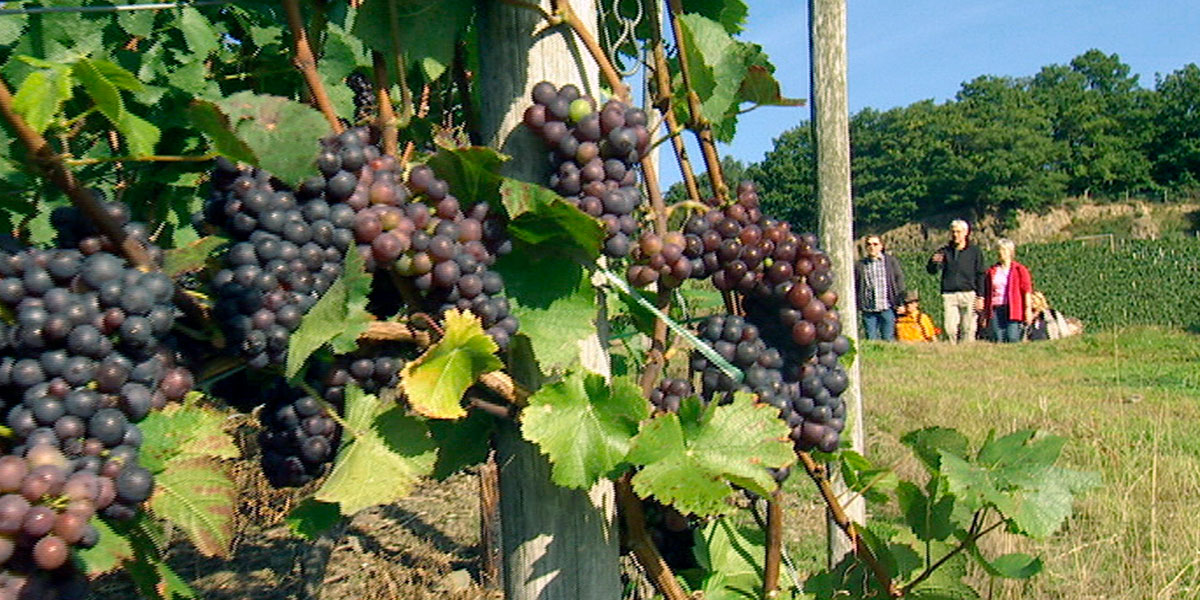 |
3sat, 3 .00 p.m.
On the border to Albania, Lojze Wieser and Martin Traxl travel through the largest inland body of water in the Balkans, Lake Scutari, on whose shores the autochthonous Crmnicko wine thrives.
hr-television, 4.00 p.m.
The gourmet tour first takes you to the Rhine: to the largest Rhine island, the Mariannenaue. Wine has been grown here for hundreds of years - a light, sparkling Chardonnay. The wild boars also appreciate the taste of the grapes - and that's why many of them go into the sausage. During a romantic picnic on the island, winemaker Stefan Lergenmüller tastes sausage and wine with his friends. Afterwards, there is an exclusive tour of the huge cellars of Reinhardshausen Castle. The tour continues to Rüdesheim. After the grape harvest, the Rheingau has quietened down a bit. A nice opportunity to walk in the colourful vineyards and have a good meal afterwards.
SWR Television, 2.30 p.m.
It's off to the Moselle to the wine village of Nittel. Thomas Sonntag is an organic winegrower here and is convinced that the former sea can still be tasted in his wine today.
Bavarian Television, 11.55 a.m.
Along the Loire river, not only imposing castles and gardens attract visitors, but also famous wine regions such as Sancerre.
rbb Television, 12.15 p.m.
This popular holiday region is nestled between the Eastern Alps and the Dolomites, where rugged mountains meet lovely wine-growing landscapes, where the sun shines 300 days a year and where Tyrolean down-to-earthness and Italian lightness meet. On the high plateau about 1000 metres above the city, temperatures are pleasant in high summer. By bike we explore the picturesque wine villages along the South Tyrolean Wine Road to Lake Kaltern. And if you are on the road by bike, you can taste one or two good wines with a clear conscience!
Das Erste (ARD), 4.10 p.m.
The Rhine-Main region is known for good wine, so it's no surprise that the region's real estate has something to do with wine. Mareile Höppner leads the candidates first to a villa in French country house style - surrounded by wild wine, of course.
rbb television, 9.00 p.m.
Every evening, 70-year-old Klaus Wolenski works on his dream. In his garage he is building his own wooden raft with which he wants to sail into the sunset on the Havel. But before that can happen, he first has to find a successor for his organic winery Klosterhof Töplitz. No easy task, because the vintner is hard to please. So he continues to pick the grapes alone with his daughter Lara.
rbb television, 12.15 p.m.
In France, it has long been rumoured that Bordeaux is a serious rival to Paris. Bordeaux produced the philosophers Michel de Montaigne and Montesquieu, its architecture is a prime example of classicism, and Bordeaux is the world capital of wine. A visit to the wine museum "Cité du Vin" is a must. Film author Christine Seemann explores the city the French way in a restored 2CV lady with a Charleston look. Its owner, Martine Marcheras, charmingly guides us through the city on the Garonne. Christine Seemann turns her back on the coast and drives eastwards into the heart of the Bordelais to Saint Émilion. The gently rolling wine-growing region was the first to be put on UNESCO's World Heritage List. For Saint Émilion is a synthesis of the arts, as it nestles picturesquely into the landscape, full of enchanted corners and architectural treasures. And wine is the elixir of life around which everything revolves. In September, the Jurade, the wine fraternity, gives permission for the grape harvest - a cause for celebration. An emotional spectacle that enchants not only wine lovers.
hr-television, 12.30 p.m.
Mayor Georg Plattner returns from Brussels with four million euros in subsidies for a new marketing structure. He wants to set up a new winegrowers' association that can sell high quality at low prices. Since he misinforms Thomas Stickler about this, the latter has to refuse membership. Georg definitely does not want Thomas to gain a foothold as a winegrower in Rust - if he has not managed to do so by the time of the harvest, he now wants to prevent his rival from selling the wine to the buyer at all costs. Grand vintner and former mayor Gottfried Schnell sees this as a new devilry on Georg's part and joins the new cooperative. Georg must experience with great annoyance how his predecessor in office tactically undermines him. Thomas and Paul are distressed to discover that their first sales contract with the wine merchant is a long time coming.
3sat, 4.00 p.m.
Times are changing, albeit slowly. For example, the wine-growing areas around Cape Town used to be the domain of whites, but today you can also meet black winegrowers here.
ARD-alpha, 6.30 p.m.
Michaela Killer from Straßlach turned her life around. She gave up her career as a businesswoman and bought a ranch with a historic western town north of L.A. with her husband, a former primary school teacher. Today they grow Pinot Noir. "Killer West" is the name of their wine for 30 dollars a bottle.
ZDFinfo, 6.30 a.m.
Thieves harvest an entire vineyard overnight. Estimated loss: 15,000 euros. Professional gangs are also on the loose in orchards. Farmers and police hunt down the culprits.
MDR Television, 8.00 a.m.
Jan Hock is no normal vintner: He works with 33 mentally handicapped people and manages the viticulture of the Lebenshilfe Bad Dürkheim. Not a job like any other. The 30-year-old winemaker gives people with mental disabilities back a piece of normality by finding them work with him. He likes the warmth of working with his special helpers. They put their hearts into it, are brutally honest, there are always surprises and it is nice to see how everyone shows up to work motivated every morning. But this year everything is different. Because of the rainy spring and summer, he expects a poor harvest and heavy financial losses. At the same time, the self-help association Lebenshilfe depends on the income from viticulture, which it uses to support other, less lucrative areas of the association and to maintain jobs for people with mental disabilities. Jan Hock has a heavy burden on his shoulders. Will he manage to keep the financial losses as low as possible and thus preserve the jobs for Lebenshilfe? In addition, he and his wife are expecting a child. Right now, they would both like to have more time to adjust to the new situation. But Jan Hock is under so much pressure professionally that he can hardly manage that. So everything comes together for the young winegrower this autumn.
Bavarian Television, 1.00 p.m.
Wine and strawberries can be found on the Ingenhof farm in Malkwitz near Malente, in the middle of Holstein Switzerland. The Engel family handed over the farm two years ago to their youngest daughter Melanie, who lives on the farm with her two children Jonna and Jorge and her parents. With Melanie Engel, a new management style has taken hold on the farm. She relies more on teamwork than on rigid hierarchical structures; more individual responsibility is demanded of the employees. Strawberries are the most important crop on the Ingenhof. But for a few years now, wine has also been grown on the hilly fields in Holstein Switzerland. This is one of many ideas that Melanie Engel has realised as a new challenge for her farm. On a south-facing slope with a 30-degree incline, the white wine variety Solaris and the red wine varieties Regent and Cabernet Cortis now thrive. At first, viticulture was slow and yields were low. But Melanie Engel and her assistant Jan Carstens got help from a winemaker in southern Germany. Patrick Balz, who has a vineyard in Rheinhessen, also advises the two on site, because winegrowing has to be learned.
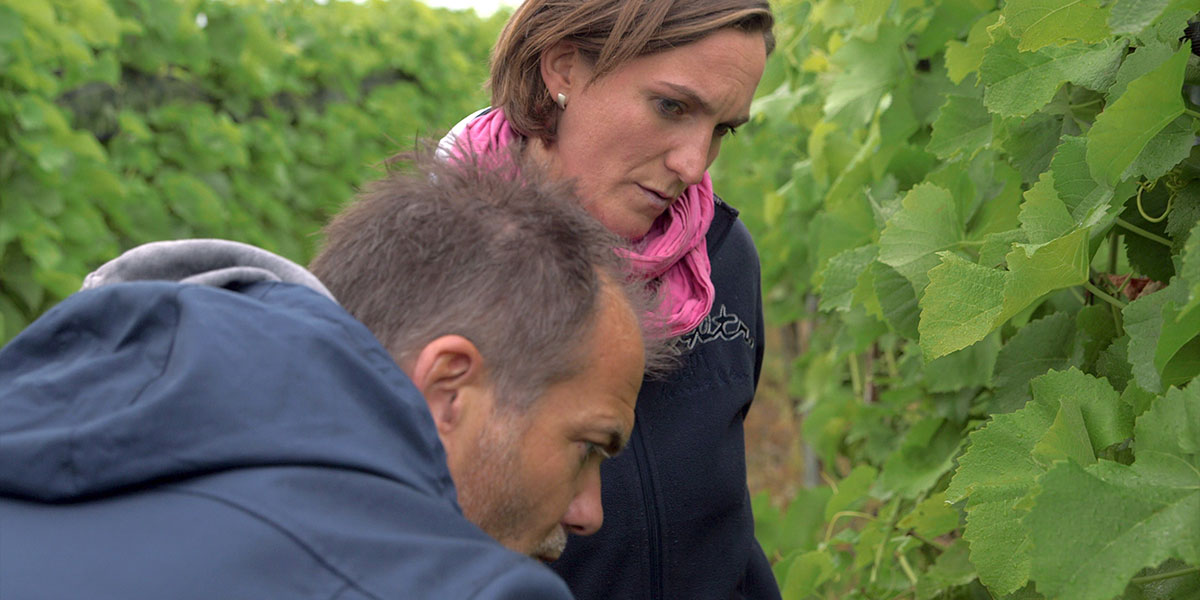 |
Bavarian Television, 11.55 a.m.
In France, it has long been rumoured that Bordeaux is a serious rival to Paris. Bordeaux produced the philosophers Michel de Montaigne and Montesquieu, its architecture is a prime example of classicism, and Bordeaux is the world capital of wine. In Bordeaux, a visit to the wine museum "Cité du Vin" is a must. Film author Christine Seemann explores the city the French way in a restored 2CV lady with a Charleston look. Her owner Martine Marcheras guides her through the city on the Garonne. Christine Seemann turns her back on the coast and drives eastwards into the heart of the Bordelais to Saint Émilion. The gently rolling wine-growing region was the first to be put on UNESCO's World Heritage List. For Saint Émilion is a synthesis of the arts, as it nestles picturesquely into the landscape, full of enchanted corners and architectural treasures. And wine is the elixir of life around which everything revolves. In September, the Jurade, the wine fraternity, gives permission for the grape harvest - a cause for celebration. An emotional spectacle that enchants not only wine lovers.
GEO Television, 5.20 a.m.
While the rain queen of an African tribe is performing her annual ritual, a team of scientists is testing a high-tech rain generation system just a few kilometres away. The winegrowers in France, on the other hand, would prefer to drive away the dark clouds and try to prevent hailstorms with chemical projectiles.
arte, 5.10 p.m.
Elisa Moed, a Jew, and Christina Samara, a Palestinian, organise culinary encounters with inhabitants on both sides of the Holy Land and take the arte reporter on a tour of the Palestinian territory. Together they visit a Jewish vintner in the West Bank who produces kosher wine in the Israeli settlement of Har Bracha. The culinary journey continues past olive groves and banana plantations, high into the north of Israel: to Galilee, which is considered one of the best wine-growing regions in Israel. Wine was already cultivated here 6,000 years ago. Under Islamic rule, the production of alcohol was forbidden for centuries. Baron Rothschild invested millions at the end of the 19th century, but it was not until the 1980s that the wine revolution began in Israel. Today there are over 200 boutique wineries. On the border with Lebanon, Tom helps with the grape harvest at Tulip Winery. The young owner Roy Itzhaki has realised a vision with Tulip: he produces top quality wine with employees who are mentally disabled. His winery is located in the middle of the disabled village Kfar Tikva, the "village of hope".
rbb television, 12.15 p.m.
In France, it has long been rumoured that Bordeaux is a serious rival to Paris. Bordeaux produced the philosophers Michel de Montaigne and Montesquieu, its architecture is a prime example of classicism, and Bordeaux is the world capital of wine. A visit to the wine museum "Cité du Vin" is a must. Film author Christine Seemann explores the city the French way in a restored 2CV lady with a Charleston look. Its owner, Martine Marcheras, charmingly guides us through the city on the Garonne. Christine Seemann turns her back on the coast and drives eastwards into the heart of the Bordelais to Saint Émilion. The gently rolling wine-growing region was the first to be put on UNESCO's World Heritage List. For Saint Émilion is a synthesis of the arts, as it nestles picturesquely into the landscape, full of enchanted corners and architectural treasures. And wine is the elixir of life around which everything revolves. In September, the Jurade, the wine fraternity, gives permission for the grape harvest - a cause for celebration. An emotional spectacle that enchants not only wine lovers.
SR Television, 8.15 p.m.
Things are happening in the wine scene on the Saar and Upper Moselle. The children of long-established winegrowing families are starting to work in the wineries and are breaking new ground. Or young people are doing their own unusual wine project. We are in the Moselle wine-growing region, the fifth largest in Germany, and nowhere are there steeper vineyards. The most expensive Rieslings come from there. The feature shows the personal stories of six young winegrowers or winegrowing families: from the family business to the salaried farm manager to the small vineyard of one's own that is farmed in the evening. Two of our winemakers are new discoveries of 2018, have been awarded by the wine guides Gault & Millau and Vinum. What they all have in common is the joy of making wine. The young winemakers are mostly highly educated, have completed a winemaking degree in addition to their apprenticeship and have looked beyond their own nose, for example in South Africa or New Zealand. As a result, they are strongly networked and bring many new ideas to their home region. They help each other and exchange ideas, give each other feedback and want to make simple, natural wines, often spontaneously fermented. Far away from brass bands and wine queens, they organise cross-border wine events, present themselves as modern and cosmopolitan and are thus ambassadors for the region. In addition to the feature "Old vines, young ideas", the Saarthema also features a short talk on development trends in regional wine and the upcoming super wine year 2018. Roman Bonnaire guides the programme.
hr-fernsehen, 9.00 p.m.
The popular holiday region of South Tyrol is nestled between the Eastern Alps and the Dolomites, where rugged mountains meet lovely wine-growing landscapes, where the sun shines 300 days a year and where Tyrolean down-to-earthness and Italian lightness go hand in hand.
ARD-alpha, 9.30 a.m.
Jan Hock is no normal vintner: he works with 33 mentally handicapped people and manages the viticulture of the Lebenshilfe Bad Dürkheim. Not a job like any other. The 30-year-old winemaker gives people with mental disabilities back a piece of normality by finding them work with him. He likes the warmth of working with his special helpers. They put their hearts into it, are brutally honest, there are always surprises and it is nice to see how everyone shows up to work motivated every morning. But this year everything is different. Because of the rainy spring and summer, he expects a poor harvest and heavy financial losses. At the same time, the self-help association Lebenshilfe depends on the income from viticulture, which it uses to support other, less lucrative areas of the association and to maintain jobs for people with mental disabilities. Jan Hock has a heavy burden on his shoulders. Will he manage to keep the financial losses as low as possible and thus preserve the jobs for Lebenshilfe? In addition, he and his wife are expecting a child. Right now, they would both like to have more time to adjust to the new situation. But Jan Hock is under so much pressure professionally that he can hardly manage that. So everything comes together for the young winegrower this autumn.
hr-television, 12.25 p.m.
Thomas Stickler has settled down in Rust after all the turmoil of the past and is happily in a relationship with his childhood sweetheart, cellar master Claudia Plattner. Together with their son Paul, Thomas runs the winery "Stickler & Stickler". But the idyll does not last long: Right at the beginning of his second season as a winegrower, Thomas suffers a bitter setback. A large part of the harvest fails to materialise due to severe frost. When the powerful winegrowers' cooperative under the leadership of mayor and winemaker Georg Plattner, Thomas' brother-in-law and arch-enemy, pushes wine prices down to the cellar, Thomas Stickler's calculations don't work out and he is faced with a huge mountain of debt.
3sat, 16.45
The documentary accompanies life at the lake, which is determined by gentle tourism, festivals, a future-oriented wine industry and the meeting of different cultural groups.
3sat, 1.10 pm
Extensive alpine pastures, untouched river landscapes, lovely vineyards and golden pumpkin fields - the Schilcherland. In culinary terms, the region is one thing above all: pure Styria. The world-famous pumpkin seed oil, also known as "the green gold of Styria", is produced here. And as the namesake of the province, it is the home of the popular Schilcher wine. The distinctive rosé wine is made from the Blaue Wildbachertraube grape. The wine has a long history: it was the Styrian prince Archduke Johann who had these vines cultivated on a grand scale. Only in Schilcherland, from Stainz to Deutschlandsberg to Eibiswald, does the grape variety find the best soils and the right climate.
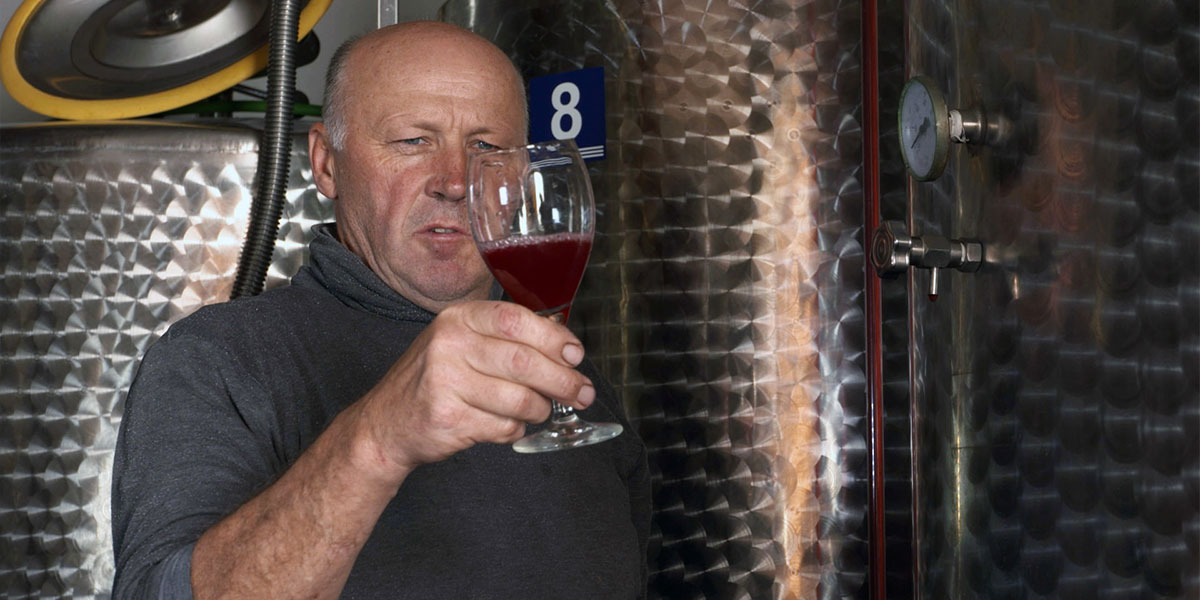 |
SWR Television, 1.45 p.m.
Since 1949, the wine queens from the German wine-growing regions have been competing in a friendly competition for the crown of German Wine Queen. Traditionally, the event takes place in the Saalbau in Neustadt an der Weinstraße. This time, twelve candidates are taking part in the preliminary decision for the election of the 70th German Wine Queen. With the exception of the representative of the Ahr, all the regional wine queens of the German wine-growing regions are taking part in the election. Holger Wienpahl will host the show in which the candidates will present themselves to the 70-member jury with experts from the wine industry, politics and the media. In particular, they have to show their expertise and answer complex questions about winemaking, viticulture and wine marketing in a competent, understandable and concise manner - and this also in English. The jury will select six finalists who will compete in the final on 28 September at the same venue.
WDR Television, 2.45 p.m.
Montepulciano is situated on a hill surrounded by vineyards. One of the most magnificent of the many Renaissance buildings is the Palazzo Ricci. This is where the Cologne Academy of Music runs the European Academy for Music and the Performing Arts. Tamina Kallert gets a guided tour with music and visits the historic wine cellar.
3sat, 6.30 p.m.
They are good friends. One is a forest warden, the other a woodcutter. They both love their forest more than anything else - and they both like wine. So they came up with the idea of bringing forest and wine together. Their dream was to mature their own wine in a barrique barrel. Without further ado, the two friends cut down an oak tree in their forest. With the helpful support of a cooper and a winemaker, the dream became reality. From the felling of a tree to the wine tasting, from the canton of Vaud to Burgundy, film author Romain Guélat followed the project of the two friends over four years. An exciting story of friendship, patience and respect for nature.
Bavarian Television, 11.55 a.m.
The Moselle - that means at least 25 spectacular loops, spread over 545 kilometres of waterway and lots of castles in the landscape. Whether you travel the region by boat, by bike or on foot, in addition to unique vineyards, a diverse culture and enchanting nature, you will always encounter very warm hosts. This is one of the reasons why the Moselle region has long been one of the most popular holiday destinations in Germany. Film author Monika Birk travels between Trier and Cochem, discovers winegrowers and their wines, hikes and walks in the footsteps of the Romans, tastes the region's delicious cuisine and, above all, enjoys the gentle, lovely landscape - from the countryside and sometimes from a boat.
ARD-alpha, 4.00 p.m.
This film documentary from 1965 shows what a winegrowers' cooperative is, how it works and how it is represented in the winegrowers' cooperative in Iphofen in Lower Franconia. There are shots of the grape harvest and of the testing of the sugar content, you see the cellar master preparing the fermentation and you also see a semi-automatic bottling plant, at the end of which the famous Bocksbeutel bottles finally come out. In the winegrowers' cooperative, also called a cellar cooperative, the winegrowers press their grapes centrally in order to then market the wine under a common name. The winegrowers' cooperative is thus an association of winegrowers from one place or one growing region and offers its members some advantages: Experts such as oenologists or marketing specialists can be engaged, there can be an improved selection of special grape qualities due to the larger common vineyard area, etc.
SWR Television, 8.15 p.m.
Who will be the new German Wine Queen? Six candidates have made it to the final for the election of the 70th German Wine Queen. Twelve regional wine queens of the German wine-growing regions were in the preliminary decision. Since 1949, the wine queens from the German wine-growing regions have been competing in a friendly competition. Traditionally, the event takes place in the Saalbau in Neustadt an der Weinstraße. Holger Wienpahl moderates the live broadcast in which the candidates will present themselves to the 70-member jury with experts from the wine industry, politics and the media. In particular, they will have to shine with their wine knowledge, but quick-wittedness and charm will of course also play a major role in the big show.
3sat, 15.00
Organic gardener Karl Ploberger cannot escape the magic of this island. He wanders between fragrant pine trees, orange groves and beautiful vines in the hinterland.
3sat, 1.05 pm
The EU Interreg programme "Rebecka" is researching the effects of global warming on the cultivation of wine, especially the Pinot Noir variety, at high altitudes. Corresponding institutions in Bolzano, Graz and Klagenfurt cooperate across borders. In recent years, 150 hectares have been planted with vines in Carinthia and 100,000 bottles of wine were bottled for the first time in 2011. No other country in the EU cultivates such a high level of viticulture as South Tyrol. The best wine thrives up to 1400 metres above sea level. The reasons for this are climate change on the one hand, but also new, frost- and fungus-resistant varieties on the other. More and more forest and pasture land above 1000 metres is making way for wine. Of course, all this is strictly controlled and regulated. While many wine-growing areas in Europe are being reduced in size and the EU's grubbing-up premiums provide the incentive, viticulture is becoming native to the high mountains. The wine belt has also grown northwards, as far as Sweden, England and Denmark. Wine is also growing again in North Tyrol. For viticulture had a long tradition in North Tyrol. Even the Romans are said to have made wine in the Alps a good 2000 years ago. The first documented mention of North Tyrolean wines dates back to 869. In the area around Imst, field names such as "Weinberg" or "Weinleiten" bear witness to the winegrowing history. In 2017, the total North Tyrolean wine-growing area is around ten hectares.
arte, 7.30 p.m.
The area around Bad Ragaz in the Swiss canton of St. Gallen is the insider's tip among the world's wine-growing regions. Powerful barrique wines, mainly Pinot Noir, are the flagship here. The programme is also available online from 30/09 to 07/10 on the ARTE internet portal.
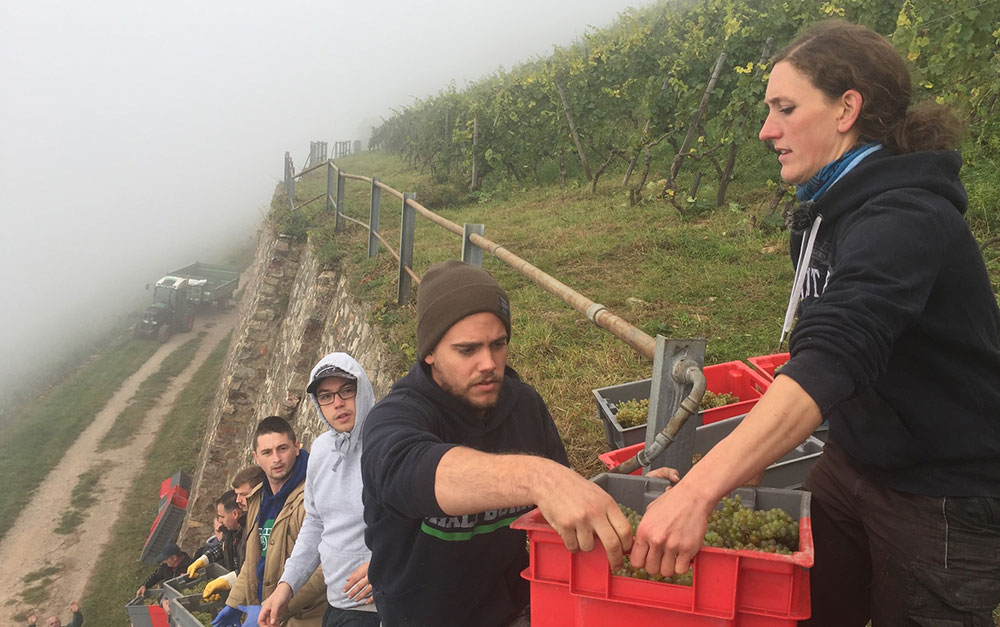 |
3sat, 1.05 p.m.
The EU Interreg programme "Rebecka" is researching the effects of global warming on the cultivation of wine, especially the Pinot Noir variety, at high altitudes. Corresponding institutions in Bolzano, Graz and Klagenfurt cooperate across borders. In recent years, 150 hectares have been planted with vines in Carinthia and 100,000 bottles of wine were bottled for the first time in 2011. No other country in the EU cultivates such a high level of viticulture as South Tyrol. The best wine thrives up to 1400 metres above sea level. The reasons for this are climate change on the one hand, but also new, frost- and fungus-resistant varieties on the other.
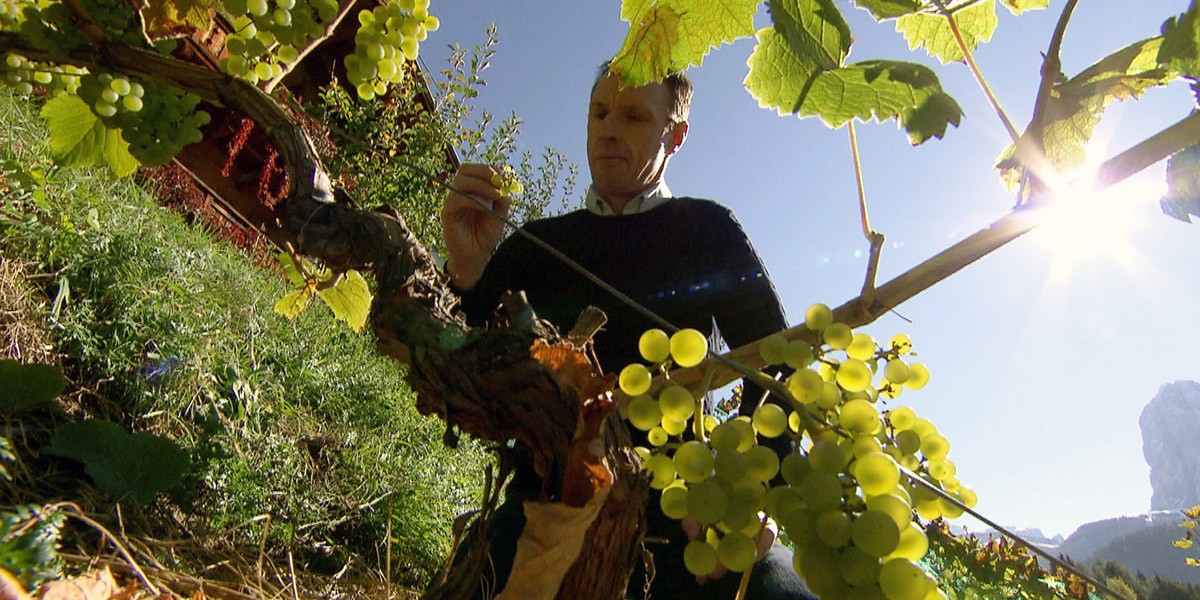 |